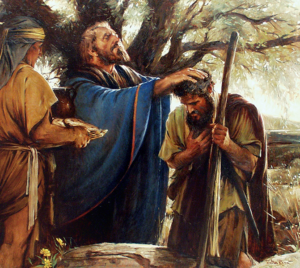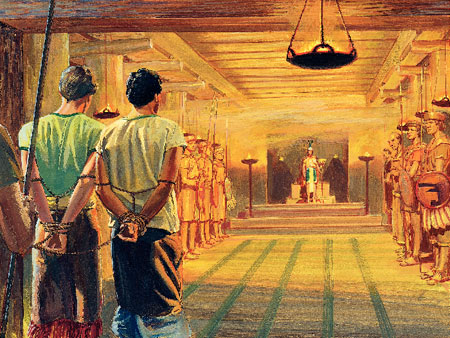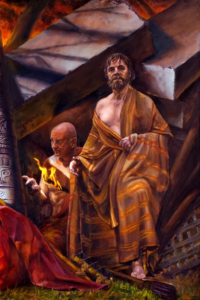To accompany your Come Follow Me study for June 24-30
In addition to reading Alma 13-16, you will enjoy the following related videos:
You will also enjoy the following related commentary from the Book of Mormon Institute student manual:
If you would like a Kahoot game related to this material which you could use for personal study or use with your family or your class, click here: https://create.kahoot.it/share/alma-13-16/41afda78-a2d8-41a5-b2b9-5e8a5c9d1fb7 . To use it with a group, after clicking on this link, you will need to log into Kahoot, creating a free account if you have not done so previously, then click on the blue “Start” button. Some of the Kahoot questions may presuppose that the player has read through the suggested answers to the following Points to Ponder and at least has browsed the Institute student manual as well.
Points to Ponder in Alma 13-16
1. Alma 13 provides the clearest statement in the Book of Mormon on the subject of
a. the pre-mortal life
b. the resurrection
c. eternal family relationships
d. the atonement of Christ
2. If one were “foreordained” to be a bishop he
a. would definitely become a bishop someday, whether he wanted to or not
b. would definitely be called as a bishop someday, but would be able to choose whether or not to accept the call
c. would someday be called as a bishop if he lived worthy of it and prepared for it
d. could be considered as a bishop someday but whether or not he was called would depend on whether or not his ward needed him, no matter how righteous and prepared he might be
3. What do we learn in this week’s reading about Melchizedek that we learn nowhere else?
a. Abraham paid his tithing to him.
b. He was a king of Salem.
c. His people repented following his preaching.
d. The Melchizedek Priesthood was named after him.
e. His father was Shem.

4. Why has Hebrews 7:3 been so puzzling to non-Latter-day Saints? How does Alma 13 make it much less puzzling?
5. In Alma 4:16 we find Alma resigning as chief judge and appointing a “wise man,” Nephihah, to take his place, but only two years later we find the “chief judge of the land” persecuting Alma and Amulek. Why?
a. Nephihah had been misled by Zeezrom to oppose the church.
b. Nephihah had always been a wolf in sheep’s clothing and Alma should never have appointed him.
c. Nephihah had been deposed and his unrighteous son was ruling in his stead.
d. The “chief judge” of 14:14 wasn’t as “chief” as Nephihah.
6. Why didn’t Alma and Amulek say anything to their opponents in Alma 14:17, 18, and 19? What do we learn from their example?

7. If everyone else in the prison was killed when the walls fell in 14:27-28, why weren’t Alma and Amulek hurt?

8. In 13:24 and 16:16 we find that the Lord was sending angels and his Spirit to an unusual degree to prepare people for his coming. What have you seen or heard to suggest that the Lord is or is not doing the same thing in preparation for his Second Coming?
9. Where other than Alma 13 can you learn things about Melchizedek that those other than Latter-day Saints know nothing about?
Give chapter and verse for the following ideas:
10. All men were created equal—at least in the premortal life.
11. A man doesn’t lose his priesthood when he dies.
12. A good rebuttal to the excuse, “Well, nobody’s perfect.”
13. A truly righteous individual would not enjoy most of today’s movies and TV programs.
14. The attitude we ought to have toward the timing of the Second Coming.
15. It wouldn’t be wise to put off renewing your temple recommend.
16. Passage which does the most to clarify 1 Corinthians 10:13 (“God … will not suffer you to be tempted above that ye are able; but will with the temptation also make a way to escape, that ye may be able to bear it.”)
17. Scripture reading and repentance go hand in hand.
18. The essence of “hell” is a guilty conscience.
19. One reason the Lord doesn’t always intervene to prevent evil and suffering in the world.

20. The Lord will protect us, if we are righteous, until our mortal mission is completed.
21. A classic case of psychosomatic illness.
22. In one sense Amulek lost even more than those whose wives and children were thrown into the great fire.
23. What do you consider the greatest miracle recorded in this week’s four chapters?
Possible Answers to Points to Ponder in Alma 13-16
1. Alma 13 provides the clearest statement in the Book of Mormon on the subject of
a. the pre-mortal life
b. the resurrection
c. eternal family relationships
d. the atonement of Christ
2. If one were “foreordained” to be a bishop he
a. would definitely become a bishop someday, whether he wanted to or not
b. would definitely be called as a bishop someday, but would be able to choose whether or not to accept the call
c. would someday be called as a bishop if he lived worthy of it and prepared for it
d. could be considered as a bishop someday but whether or not he was called would depend on whether or not his ward needed him, no matter how righteous and prepared he might be
3. What do we learn in this week’s reading about Melchizedek that we learn nowhere else?
a. Abraham paid his tithing to him.
b. He was a king of Salem.
c. His people repented following his preaching.
d. The Melchizedek Priesthood was named after him.
e. His father was Shem.
4. Why has Hebrews 7:3 been so puzzling to non-Latter-day Saints? How does Alma 13 make it much less puzzling?
As it stands, Hebrews 7:3 makes it appear that Melchizedek himself had neither a father nor a mother and had existed forever. Alma 13:7 makes it clear (as does the JST version of Hebrews 7:3) that it is the high priesthood, not Melchizedek the man, which “was without father,” etc. Unlike the Aaronic Priesthood, which anciently was given only to those who were of the tribe of Levi, the Melchizedek Priesthood has always been conferred according to worthiness, regardless of who one’s father or mother might have been.
5. In Alma 4:16 we find Alma resigning as chief judge and appointing a “wise man,” Nephihah, to take his place, but only two years later we find the “chief judge of the land” persecuting Alma and Amulek. Why?
a. Nephihah had been misled by Zeezrom to oppose the church.
b. Nephihah had always been a wolf in sheep’s clothing and Alma should never have appointed him.
c. Nephihah had been deposed and his unrighteous son was ruling in his stead.
d. The “chief judge” of 14:14 wasn’t as “chief” as Nephihah. He was only a regional chief judge, and was far enough away from Nephihah that he could get away with things Nephihah would never have approved of.
6. Why didn’t Alma and Amulek say anything to their opponents in Alma 14:17, 18, and 19? What do we learn from their example?
Presumably for the same reason Jesus didn’t respond to his captors just before his crucifixion—it would do no good, and the questioners weren’t looking for answers but for additional pretexts for inflicting punishment. We would do well to remember that not every accusation deserves a response, and that an example of quiet dignity is often stronger than a retaliatory argument.
7. If everyone else in the prison was killed when the walls fell in 14:27-28, why weren’t Alma and Amulek hurt?
Evidently because the Lord protected them.
8. In 13:24 and 16:16 we find that the Lord was sending angels and his Spirit to an unusual degree to prepare people for his coming. What have you seen or heard to suggest that the Lord is or is not doing the same thing in preparation for his Second Coming?
Your choice. I have heard repeated stories from missionaries of investigators who had unusual spiritual experiences to prepare them for the missionaries’ visit.
9. Where other than Alma 13 can you learn things about Melchizedek that those other than Latter-day Saints know nothing about?
Genesis 14, JST.
Give chapter and verse for the following ideas, as found in Alma 13-16:
10. All men were created equal—at least in the premortal life. [Alma 13:5]
11. A man doesn’t lose his priesthood when he dies. [Alma 13:9. See also D&C 138:57.]
12. A good rebuttal to the excuse, “Well, nobody’s perfect.” [Alma 13:12.]
13. A truly righteous individual would not enjoy most of today’s movies and TV programs. [Alma 13:12]
14. The attitude we ought to have toward the timing of the Second Coming. [Alma 13:25]
15. It wouldn’t be wise to put off renewing your temple recommend. [Alma 13:27.]
16. Passage which does the most to clarify 1 Corinthians 10:13 (“God … will not suffer you to be tempted above that ye are able; but will with the temptation also make a way to escape, that ye may be able to bear it.”) [Alma 13:28]
17. Scripture reading and repentance go hand in hand. [Alma 14:1]
18. The essence of “hell” is a guilty conscience. [Alma 14:6]
19. One reason the Lord doesn’t always intervene to prevent evil and suffering in the world. [Alma 14:10-11]
20. The Lord will protect us, if we are righteous, until our mortal mission is completed. [Alma 14:13]
21. A classic case of psychosomatic illness. [Alma 15:3]
22. In one sense Amulek lost even more than those whose wives and children were thrown into the great fire.
Alma 15:16. Those whose wives and children were thrown into the fire for their faith will still have them in the life to come. But Amulek’s family appears to have rejected the gospel, so Amulek will not have the same promise of an eternal relationship with them.
23. What do you consider the greatest miracle recorded in this week’s four chapters?
Your choice. To me it may well be the conversion of Zeezrom. He had been the worst of the lawyers who opposed Alma and Amulek, much like Alma himself and the sons of Mosiah had once been “the very vilest of sinners.” (Mosiah 28:4.) But once they were touched by the Spirit of the Lord, a “mighty change” occurred, making all six as powerful on the side of right as they once had been on the side of wrong. I know of no greater miracle.
